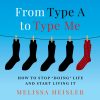The Motivation of Negativity
For decades I worked in corporate marketing and for the last few years I have created marketing for my own business as well as helping other small business with theirs. Through these experiences and the master’s program I took in Integrated Marketing Communications, it was reinforced again and again that negativity sells. More than anything else, our fears and worries motivate us. Tom Denari president and chief strategy officer at the Young & Laramore advertising agency explains, “Research in neuroscience and human behavior has determined that – – while we may not be consciously aware of it, or even want to admit it – – we humans are more influenced by bad than good.”
This all goes back to the dawn of man. If we didn’t want to be eaten by a saber tooth tiger, we had to be consciously and consistently on the lookout for danger. We are instinctively programmed to be hypervigilant and reactionary to threats around us. Marketers realized this and often use this powerful tool in their advertising. Politicians spend more money on negative attack ads against their opponents then in promoting the reasons to vote for their party. Non-profits do not focus on all the good they are doing, but hit our emotional fears through photos of a starving child, an abused dog, or the potentially harmful results of not supporting their cause. Products are positioned every day to save us from the worry of social ostracism. And these negative ads work because they trigger us on a deep level. We are afraid something is wrong. We are afraid of being different. We are afraid of not being accepted. We are afraid something bad is going to happen. We are waiting for the other shoe to drop and will do anything, buy anything, to protect ourselves. And marketers are awesome at tapping into this fear.

Article after article can be found teaching marketers how to create negative headlines, focus on a villain, and over-sensationalize issues to engage their audience. I always had a hard time with this in my own writing and marketing. I know that headlines like “The Top 10 Reasons Your Friends Hate You” will get more views than “Why You Are Perfect as You Are,” but I have a hard time consciously and intentionally tapping into instinctual reactions in order to manipulate my audience. It is very effective, but also very dishonest. And it is very bad for our health.
Being triggered by and believing in the negativity around us can result in “the nocebo effect.” The opposite of the healing mind-over-matter placebo effect, the nocebo effect is how buying into the fears advertised – think of the myriad of prescription medicine ads you see every day – actually makes us more susceptible to the illnesses. Consuming negative ads can actually cause us to experience the results the fear ads are promoting. What we focus on and believe in becomes our reality – mentally and physically. The negativity in advertising and the media also trigger the same negative stress reactions real world stressors cause. When we just think and imagine our fear, we experience the same increase in stress-related physiological responses while diminishing our natural immunity which a true life-or-death situation would induce – potentially causing long-term damage to our bodies.
Check it out for yourself. How do you feel after seeing a negative attack ad? Does your stomach do flips after seeing images of disaster? Are you depressed, tired, listless, and ill after being exposed to intense negativity on Facebook or the nightly news? There is an easy cure. Control what you digest. Stop feeding your mind with negativity. Catch yourself before you unconsciously react to a purposefully emotionally-charged negative ad or program. Notice how what you are mentally consuming is affecting your emotions and body. Limit and reduce the amount of unhelpful claptrap designed to trigger you. Take back control of your emotions from marketers, politicians, and the media. Don’t allow them to control how you are affected. Realize that you can choose your consumption and your reaction.
If you want to explore more ways to reduce the effects of being triggered by negativity, check out how to consciously work through unnecessary worry when triggered by sensational television reports.





